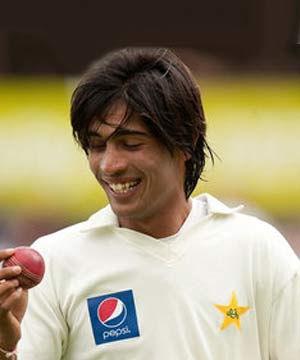(source google.com.pk)
Saeed Ajmal Biography
Full name Saeed Ajmal
Born October 14, 1977, Faisalabad, Punjab
Major teams Pakistan, Faisalabad, Islamabad Cricket Association, Khan Research Labs, Water and Power Development Authority
Playing role Bowler
Batting style Right-hand bat
Bowling style Right-arm offbreak
Saeed Ajmal, an offspinner, received a call-up to the Pakistan squad for the Asia Cup at the age of 30 after an impressive domestic season with Khan Research Labs in 2007-08, during which he took 38 wickets in 12 first-class matches at an average of 29 apiece, and 12 wickets in nine list A games. He made an immediate impression with his subtle variations, unafraid to use the doosra. But his career took off with a series of ODI performances that bewildered Australia in Dubai and Abu Dhabi; he gave away few runs and his doosra was nigh-on unreadable. The ICC called him for his action, though it was cleared soon after. The pressure didn't get to him and immediately after, he played a crucial role in Pakistan's drive to the 2009 World Twenty20 title, regularly bottling up the middle overs with Shahid Afridi. He ended the joint second-highest wicket-taker in the tournament, with an exemplary economy rate as batsmen around the world struggled to pick a big turning doosra or even cope with his changes in flight, pace and angle. Consistent performances in the ODI version have quickly earned him a reputation for choking the runs in the middle overs with clever variations.










Saeed Ajmal Biography
Full name Saeed Ajmal
Born October 14, 1977, Faisalabad, Punjab
Major teams Pakistan, Faisalabad, Islamabad Cricket Association, Khan Research Labs, Water and Power Development Authority
Playing role Bowler
Batting style Right-hand bat
Bowling style Right-arm offbreak
Saeed Ajmal, an offspinner, received a call-up to the Pakistan squad for the Asia Cup at the age of 30 after an impressive domestic season with Khan Research Labs in 2007-08, during which he took 38 wickets in 12 first-class matches at an average of 29 apiece, and 12 wickets in nine list A games. He made an immediate impression with his subtle variations, unafraid to use the doosra. But his career took off with a series of ODI performances that bewildered Australia in Dubai and Abu Dhabi; he gave away few runs and his doosra was nigh-on unreadable. The ICC called him for his action, though it was cleared soon after. The pressure didn't get to him and immediately after, he played a crucial role in Pakistan's drive to the 2009 World Twenty20 title, regularly bottling up the middle overs with Shahid Afridi. He ended the joint second-highest wicket-taker in the tournament, with an exemplary economy rate as batsmen around the world struggled to pick a big turning doosra or even cope with his changes in flight, pace and angle. Consistent performances in the ODI version have quickly earned him a reputation for choking the runs in the middle overs with clever variations.
Saeed Ajmal

Saeed Ajmal

Saeed Ajmal

Saeed Ajmal

Saeed Ajmal

Saeed Ajmal

Saeed Ajmal

Saeed Ajmal

Saeed Ajmal

Saeed Ajmal

Saeed Ajmal






































